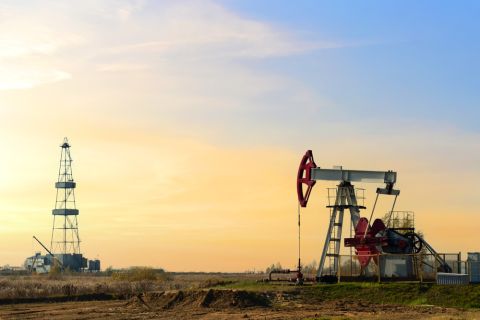A new, realistic blueprint for energy security must come to bear on U.S. energy policy--and soon--if the country is to begin weaning itself off of its dependency on foreign oil in the wake of sociopolitical instability in the Arab world.
Dismissing corn-based ethanol and carbon sequestration as "gimmicks" and contending that solar and wind power would be "thermodynamically impossible" to adopt, Dr. Michael J. Economides said he believes the predominant fuel of a "new energy economy" will be likely be natural gas, given its abundance and economic and environmental benefits.
But while gas supplies continue to build, a switch to natural gas as the primary energy resource in the U.S. certainly "won't happen overnight," according to Economides.
The professed "failed comedian," geopolitical commentator and professor of chemical engineering at the University of Houston's Cullen College of Engineering recently spoke at a topical luncheon at the Offshore Technology Conference in Houston about certain geopolitical risks affecting the current energy landscape.
In fact, due to large-scale LNG developments in Qatar, Egypt and Russia, Economides said he anticipates there will be 10 billion cubic feet per day of excess supply in the coming years, with "a major Btu disparity" lasting decades. This, he added, will be due to technology challenges, and not just resource availability.
And while excess supply will surely have a considerable impact on near-term gas prices in both the U.S. and Europe, particularly as more shale gas resources flood the market, transportation robustness and homogeneous prices the world over will equalize in the longer term, he said. Specifically, Economides said he expects to see $5 gas during the next few years, followed by a price hike to $8.
On the opposite side of the energy coin, Economides also acknowledged a topic that continues to drive current energy investment decisions, particularly during the nascent economic recovery--global oil prices. While oil futures remain in a constant state of flux, the U.S. and European benchmarks have already topped $110 per barrel this year, pricing in on heightened geopolitical risk.
According to Economides, who predicted last March that oil would take on triple digits in early 2011, headlines have ruled this bullish momentum. "The price of oil should really be around $80 per barrel," he calculated, but a series of headlining crises in early 2011 have propelled prices to levels comparable with 2008’s, before the financial crisis here and abroad brought the global economy to its knees.
Conversely, speculation can also weigh on oil prices, as evidenced by recent news of Osama bin Laden's death, which fueled speculation and tipped off a substantial 12% decrease in oil prices last week as investors seemingly grew risk averse about potential retaliation claims from certain terrorist camps in an already simmering Middle East.
Uncertainty in the oil markets was an element Economides referenced in relation to the U.S. and Europe's future energy security as the turmoil in the Middle East and North African region continues to affect energy markets and will likely do so for years to come. He also attributed the recent surge in pump prices (particularly in Europe) to the loss of high-quality Libyan crude, which is light and therefore "hard to replace."
Meanwhile, he said, OPEC has little spare capacity "behind the valve," presenting yet another serious challenge for global energy markets.
Farther East, however, lies an even bigger geopolitical challenge that will affect the U.S. during the next several decades, according to Economides. In its unabated quest to secure new energy resources across the globe during the last few years, it would appear that "China has gone berserk," he said.
During his frequent visits to advise key energy players, "the questions I get asked a lot (by the Chinese) are 'what is the U.S.'s energy policy' and 'why is the U.S. letting us do this?'," he said, noting that his answers to both of these telling questions remains one and the same: "I don't know."
To the Chinese, which Economides described as "great imitators" (rather than innovators), in the bigger macroeconomic picture, energy equals power and a clear-cut policy ensures that it will have a secure place in the rapidly developing and industrialized world. "The Chinese are capitalizing on this," Economides said, adding that the country has already surpassed the U.S. as the world's leading energy consumer.
Meanwhile, it is the hope of many that the latter view will begin shaping up domestic energy policies in the U.S, as well, although Economides is not so optimistic that this will take place under the current administration's supervision.
In late March, however, U.S. President Barack Obama acknowledged that Americans "cannot keep going from shock to trance on the issue of energy security, rushing to propose action when gas prices rise, then hitting the snooze button when they fall again." The President went on to outline an ambitious plan to reduce America's oil imports by one-third by 2025.
But while Obama pitched a series of initiatives aimed at, among other things, increased domestic oil production and the accelerated use of renewable fuels and natural gas, the U.S. arguably remains gridlocked in terms of its current energy policies.
Ever the realist, Economides pointed out that America, whose lifeblood is oil and gas, has a long way to go before it is able to transform its energy practices. Based on his estimations, traditional hydrocarbons (coal, oil and natural gas) supplied some 87% of U.S. energy demand 40 years ago and it is still supplying at that level today.
Given this statistic, solar and wind resources (which account for roughly 1% of energy supply) simply "cannot cut the mustard" against combustible hydrocarbons and nuclear in the implementation of a new energy economy, Economides said.
Contact the author, Nancy Miller, at nmiller@hartenergy.com.
Recommended Reading
McKinsey: US Output Hinges on E&P Capital Discipline, Permian Well Trends
2024-02-07 - U.S. oil production reached record levels to close out 2023. But the future of U.S. output hinges on E&P capital discipline and well-productivity trends in the Permian Basin, according to McKinsey & Co.
The Secret to Record US Oil Output? Drilling Efficiencies—EIA
2024-03-06 - Advances in horizontal drilling and fracking technologies are yielding more efficient oil wells in the U.S. even as the rig count plummets, the Energy Information Administration reported.
CERAWeek: CEO Patrick Pouyanné Jokes that Texas is TotalEnergies’ ‘El Dorado’
2024-03-19 - TotalEnergies CEO Patrick Pouyanné said during CERAWeek by S&P Global that Texas was important for his company, which he jokingly called the French company’s “El Dorado” due to the state’s love for oil, gas and renewables.
Exxon, Vitol Execs: Marrying Upstream Assets with Global Trading Prowess
2024-03-24 - Global commodities trading house Vitol likes exposure to the U.S. upstream space—while supermajor producer Exxon Mobil is digging deeper into its trading business, executives said at CERAWeek by S&P Global.
API Gulf Coast Head Touts Global Emissions Benefits of US LNG
2024-04-01 - The U.S. and Louisiana have the ability to change global emissions through the export of LNG, although new applications have been frozen by the Biden administration.





